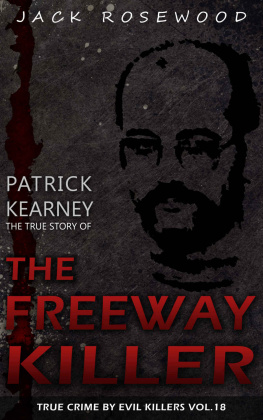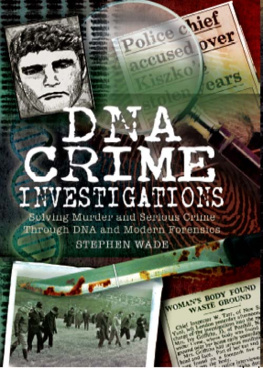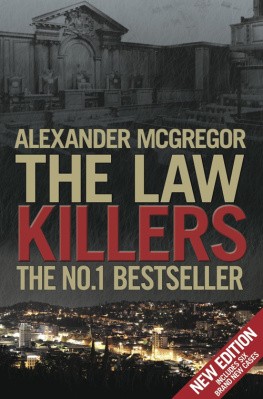Unfortunately, crime is a part of life in the modern world. That is not to say that crime is a purely modern phenomenon, but with the advent of modern technology, criminals have become more mobile. Criminals are able to easily traverse through countries and from one country to another to commit their nefarious deeds.
Because of that, it has become increasingly difficult to run away from crime.
Modern technology has also allowed international audiences to learn about high-profile crimes and in some cases for fan followings of criminals to develop.
In the pages of this book, you will learn about twelve high-profile crime cases from around the world. Some of these cases, such as the Hinterkaifeck murders and the murder of Kelly Anne Bates, attained notoriety due to their brutal and bizarre nature, while others were solved by DNA profiling after several twists and turns.
Many of the cases in this book received considerable media attention while they were ongoing, sometimes earning the often overused moniker the trial of the century. The first true trial of the century, the Helen Jewett murder case, is profiled here and compared with another notorious case from the 1990s.
Some of these cases looked like they would never be solved, but through a combination of scientific advances and good police work, the killers were eventually caught and justice was served. Unfortunately, some cases, such as the murder of Chandra Levy and the assassination of William Stewart, remain open and unsolved.
So indulged your curiosity and open the pages of this book to learn about twelve of the most baffling and bizarre cases in the annals of criminal history.
Chapter 1: The Mysterious Death of Rakhat Aliyev
Before the 2006 film Borat became a worldwide hit, few people outside of central Asia or Russia knew that that country of Kazakhstan existed. Needless to say, many citizens of the central Asian former Soviet Republic found the movies representation of them as backwards, violent, anti-Semitic people to be unfair and for the most part unfounded.
A closer look reveals that Kazakhstan is actually a complex place where modern ideas and sensibilities are woven together with centuries old traditions. The people of the land-locked nation are proud of their heritage, which can be traced back to the horseback riding Huns of the fifth century. During the Middle Ages, the majority of the people converted to Islam, which is the majority religion today. As part of the Soviet Union, Kazakhstan suffered at times, particularly during the famine of 1932-33 when over 60% of its population died. Kazakhstan was also home to many of the notorious Soviet gulags where political prisoners were sent, often to die.
Although Kazakhstan has had a difficult history, today it is far from the backwards country portrayed in Borat . Economically speaking, it is the dominant central Asian nation thanks to its rich oil reserves and deposits of other valuable minerals. Kazakhstan repaid all of the debt it owed to the International Monetary Fund seven years ahead of schedule and today its people enjoy one of the highest standards of living in the region.
Kazakhstans post-Soviet economy may be relatively strong, but its political system is another story.
Technically, Kazakhstans government is a constitutional republic, but it has been plagued with accusations of human rights abuses and political violence. Nursultan Nazarbayev has been the countrys only president since independence in 1991, which critics point to as evidence for Kazakhstan being a republic in name only.
Democracy activists and critics of Nazarbayev argue that Kazakhstans secret police service, known as the KNB, which is essentially the local successor to the Soviet KGB, has manipulated every election since independence through a combination of coercion, threats, and at times out right violence against opposition groups. The Economist lists Kazakhstan as an authoritarian regime and points to the courts as being the primary reason. There is no equivalent of Miranda rights in Kazakhstan and there is no independent judiciary all Supreme Court judges are appointed by the president.
Truly, contemporary Kazakhstan is a sometimes bizarre mix of the old and new worlds where it is not uncommon to see former KGB agents rub elbows with multi-millionaire businessmen at upscale restaurants in the countrys capital of Astana or the largest city of Almaty.
It was within this sometimes volatile social and political milieu that a series of the most mysterious deaths in Kazakhstans modern history took place.
Rakhat Aliyev
Rakhat Aliyev was born in the Soviet Socialist Republic of Kazakhstan in 1962. His early years were spent like most children around the world at the time: playing soccer with his friends and spending time with his family. But by the time Aliyev was a young adult, the winds of change were in the air.
The concepts of Glasnost and Perestroika that Mikhail Gorbechev and the Communist Party introduced to modernize and save the crumbling Soviet Union ironically led it to a quicker demise. With the total collapse of the Soviet Union in 1991, the old constituent republics such as Kazakhstan scrambled to find their place in the new world order. The 1990s became a period of great transition in the former Soviet republics, where large amounts of money could be earned and an even greater number of enemies could be made in doing so.
Rakhat Aliyev found his place in the new system.
Aliyev obtained a law degree in 1997 and a PhD in economics in 2005, which prepared him for a lucrative career in post-Soviet Kazakhstans often shady worlds of business and government. He made several lucrative investments and inserted himself into the functions of many government industries. Aliyev also was a member of the KNB and worked his way through the ranks of the organization, thanks in part to his relationship with the president.
Aliyev was married to President Nazarbayevs daughter, Dariga, for many years. The couple had three children over their decades-long marriage and by all accounts looked happy. They were one of Kazakhstans top power couples and it was rumored that Aliyev would be his father-in-laws successor.
But in 2007, Rakhat Aliyev found out that even the bonds of matrimony were not enough to protect him from the wrath of the president.
Falling Out of Favor
2007 was a bad year for Rakhat Aliyev. Up until that time, he had led a charmed life: he was a millionaire and was at the pinnacle of power in the Kazakhstan government. His wife was the favored daughter of the countrys leader and every business deal he made seemed to end favorably. Before 2007, Aliyev must have felt that the sky was the limit.














